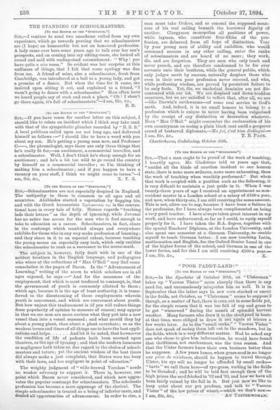[To THE EDITOR OP THE "SPECTATOR."] Sia,—Schoolmasters are not especially
despised in England. The antipathy to them is common to all ages and all countries. Alcibiades started a reputation by flogging his, and with the Greek humourists '2,aoaactroas TIC is the conven- tional hero in every tale of folly. Horace regards "teaching lads their letters" as the depth of ignominy, while Juvenal has no satire too severe for the man who is fool enough to take to education as a career. Schoolmasters, in fact, share in the contempt which mankind always and everywhere exhibits for those who in any way make profession of learning ; and they share in it to an especial extent, because teaching the young seems an especially easy task, which only entitles the schoolmaster to rank as a successor to the nurse-maid.
The subject is, however, fully dealt with in one of the noblest treatises in the English language, and pedagogues who wince at the reflections of "Max O'Rell " may find some consolation in the pages of Bacon. In the "Advancement of Learning," writing of the scorn to which scholars are in all ages exposed, he says :—" And for the meanness of the employment, that which is most traduced to contempt, is, that the government of youth is commonly allotted to them ; which age, because it is the age of least authority, it is trans- ferred to the disesteeming of those employments wherein youth is conversant, and which are conversant about youth. But how unjust this traducement is (if you will reduce things from popularity of opinion to measure of reason) may appear in that we see men are more curious what they put into a new vessel than into a vessel seasoned ; and what mould they lay about a young plant, than about a plant corrobate ; so as the weakest terms and times of all things use to have the best appli- cations and helps And let it be noted, that howsoever the condition of life of pedants hath been scorned upon theatres, as the ape of tyranny ; and that the modern looseness or negligence hath taken no due regard to the choice of school- masters and tutors ; yet the ancient wisdom of the best times did always make a just complaint, that States were too busy with their laws, and too negligent in point of education."
The weighty judgment of " wide-browed Verulam " needs no weaker advocacy to support it. There is, however, one point which Bacon never considered, and which now aggra- vates the popular contempt for schoolmasters. The scholastic profession has become a mere appanage of the clerical. The simple schoolmaster is treated as a being of inferior caste, and denied all opportunities of advancement. In order to rise, a man must take Orders, and so conceal the supposed mean- ness of his real calling beneath the borrowed dignity ofi another. Clergymen monopolise all positions of power, while laymen, who constitute four-fifths of the pro- fession, are debarred from all hope of distinction. Year by year young men of ability and ambition, who would command success in any other calling, enter the ranka of schoolmasters and are heard of no more; they work, die, and are forgotten. They are men who only teach and never preach, and are therefore condemned to be for ever servants unto their brethren, while the general public, which, only judges merit by success, naturally despises those who even in their own poor profession never succeed, and who, while professing wisdom, are proved by persistent failure to. be only fools. Yet, Sir, we unclerical dominies are not dis- contented with our lot. We are despised and down-trodden creatures, but we are satisfied to reflect that, after all, we are —like Darwin's earthworms—of some real service to God's earth. And, indeed, it is no small honour to belong to a profession which is unique in never having been vulgarised. by the receipt of any distinction or decoration whatever. Even "Max O'Rell " might remember the exclamation of his own countryman on seeing a plain black coat amid a gorgeous crowd of bestarred diplomats,—Ma foi, c'eet bien distdngue.—L- I am, Sir, &c., T. E. PAGE. Charterhouse, Godalming, October 20th.






































 Previous page
Previous page